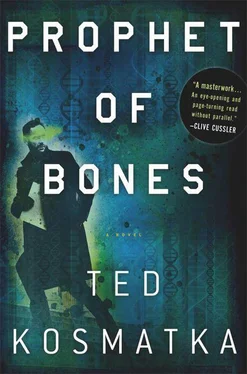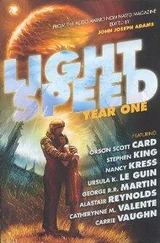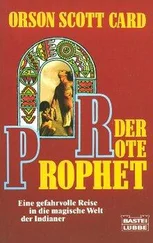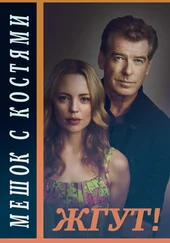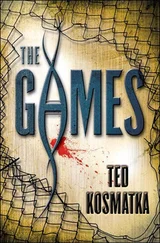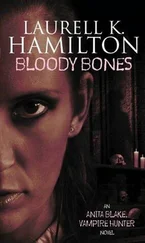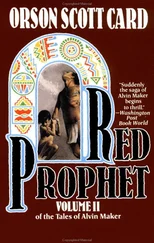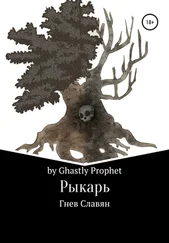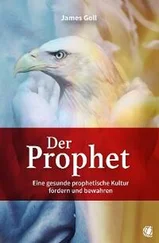The old man reached for his silverware. He unrolled the napkin and spilled the silverware across the table. He grabbed a second and third napkin and did the same. Then a fourth. He laid the silverware out in a pattern: two forks, two tablespoons, two teaspoons, two knives, side by side. He laid out a second group of silverware in an identical pattern. “You see, they are the same,” he said. “These are our chromosomes. Forks are chromosome one. Tablespoons are chromosome two. Teaspoons, chromosome three. Knives, chromosome four, and so on. Us and them.” He gestured to the two matching sets of silverware.
He continued: “Our chromosome number one looks like their chromosome number one. Our chromosome three looks like their chromosome three. Do you see?” He slid the fork from one group and he set it next to the first fork from the other, putting them side by side. “They line up just right. If you butt them up against each other in a petri dish, you’ll get linkage, chiasma, meiosis, all the old black magic.”
The old man glared at them from across the stretch of silverware.
“But then what of the chimp’s extra chromosome, you ask?” Martial took a sip of his water. “Chimps have an extra pair, after all.”
The old man looked at Lilli. She stared back at him without flinching.
“Did it come from thin air?” the old man asked. “What is this strange piece of DNA that makes a chimp a chimp?”
The old man was giving a class, Paul realized. They were his students.
The old man took one little teaspoon from the second grouping and bent it at the thin point of its neck. He bent it again, back and forth at the same spot until the spoon snapped in two. He laid both halves back on the table. “This is the chimp,” he said. “Not an extra chromosome, not really. Simply a broken one. Consider it for a moment. Maybe in this way, God created the animals. Taking a piece of this and a piece of that, moving the DNA around like a composer might shift the register of a sonata.”
The old man smiled and leaned forward again, staring at them now.
“And now I confess my greatest sin. It occurred to me to wonder how He might have done it.” His smile widened, showing worn and ancient teeth. “Poof!” he said. “Like magic? Or with a methodology behind it? Was there a lab, I wonder? Different tries? Failed experiments?”
“You’re crazy,” Lilli said.
The old man’s smile flitted away, and he slammed his hand down on the table again. The silverware jumped, scrambling the carefully assembled order, shifting the pattern into a new configuration. Mutation before their eyes.
“There are those who would look away from uncomfortable truths. I have never been one of those men. What about you, Paul? How uncomfortable are you willing to be?”
The old man took a bite of pineapple and stood. He wiped the corner of his mouth with a napkin.
“What were those things that attacked us?” Paul asked.
“Perhaps you’d like to see.” The old man turned and walked outside.
Paul and Lilli looked at each other for a moment, then followed Martial out of the veranda and along a trail leading to another part of the facility. The facility was like a web with many parts. Martial was the spider.
The old man hobbled his way up the trail. He moved slowly, his breath coming in a sickly whistle. Though his words were still sharp, his body was failing him. He would not be long for this world. A few years more, maybe. Following the old man up the trail, Paul wondered what would happen if they tried to escape. How far would they get? He had no doubt they were being monitored. He saw men just at the edge of his vision. Standing alert. Watching as they passed. As if the old man’s casual-seeming walk had been scripted at a security meeting that morning, gone over in intricate detail. Paul wondered how much of today had been planned in advance.
The old man came to a huge white building. He opened the door and they entered a large room, much like the ape house from the previous night. Huge, domed ceiling. White walls. Cages nearly to the ceiling. Light streamed through skylights overhead. The place had the smell of newness to it, like it had never been used. It had the look of something that was about to be, rather than something that was.
“This is where we will house them,” the old man said.
“Them?”
“The specimens, when they are born.”
They walked through the booming expanse, Martial’s leather dress shoes clicking on the hard cement floor.
They came to the other end of the room and exited to the outside. An identical building stood across from them, connected by a short cement sidewalk. From inside the building came a strange screeching sound. Whatever would someday fill the empty cages now lived in there.
The old man stopped and considered the building.
“Are we going in?” Paul said.
The old man turned, the fibrous tendons in his neck seeming to creak. “After you,” he said.
Paul opened the door and stepped inside.
They passed into another nightmare room. A lower ring of hell.
Sunlight streamed through the skylights, but the place was a screeching madhouse. Alive with hoots and calls, maddening shrieks. Paul brought his fingers up to cover his ears as the screaming grew louder—a chorus of dozens, a hundred.
Cages lined the walls. On one side chimps, on the other gorillas.
“We crossed them,” the old man said. “The success rate was lower than I’d expected, but viable offspring were produced. Several dozen survived to adulthood, as you can see.” He gestured.
Paul saw then that, farther into the room, most of the cages held not chimps or gorillas but something intermediate.
“As with all hybrids, it depended on the nature of the cross. Chimp-gorilla produced a different phenotypic expression than gorilla-chimp.”
They continued walking. The faces in the cage leered out at them. Lilli stayed close to Paul.
Halfway across the room was a small control room. Thick glass and bars on the windows, and inside, against the wall, a small bank of switches set in a gray panel. “The cage doors are all controlled from here,” Martial said, gesturing at the room. “State-of-the-art.” He kept walking, leading them farther in. “Handling apes successfully requires a high degree of specialized care. Apes are hierarchical by nature—driven not just for resources but to be at the top of the social order. This does not change in captivity. Even in the absence of a food shortage, they will still sometimes kill each other if we let them. In this way they are very like humans.”
The old man slowed and turned toward Paul. “Primates come programmed to compete. It is our specialty. Some would say that it is the runaway amplification of this trait that has led to everything you see—cities, technology, civilization itself.”
Finally the old man stopped. He stood before a cage at the end of the tier. “This,” he said, “was our first chimp-gorilla hybrid. Chimp father, gorilla mother.”
The creature was strange—huge, almost like a gorilla, but lean and long. Its face was narrow. Its shoulders wider than a chimp’s. Neither chimp nor gorilla but something of both.
“Like the chimp, the gorilla has forty-eight chromosomes, but genetically, chimps are more closely related to humans than they are to gorillas.”
“How can that be if the chromosome count is different?” Lilli asked.
“It is simple. When God made humans, he fused two chimp chromosomes together. We know exactly which ones.”
The old man scraped a line in the sawdust with the tip of his shoe. The line was a yard long. He drew another line that intersected it, forming a V. He drew a third line that intersected the first.
He said, “Before the late 1980s, we assumed the association between the species was this. Us, gorilla, chimp.”
Читать дальше
